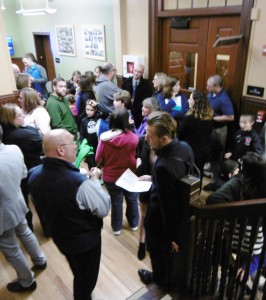
Educators, parents and students gathered before the School Committee meeting on Monday. (Photo by Amy Porter)
WESTFIELD – Several parents spoke up during the public participation portion of the School Committee meeting on Monday both for and against the Implementation of the Life-Threatening Allergy Policy that recently went into effect in Westfield Public Schools.
The policy, which is available on the district website, bans the use of food as a reward in classrooms, and requires that all parties or celebrations during the school day be food free.
Several of the parents who spoke in favor of the policy have children who suffer from life-threatening food allergies, and said it is necessary to protect the safety of the children.
Amanda LeFew said the responsibility for a child’s safety should not fall entirely upon the child’s family, and never on the children themselves.
“The life-threatening food policy is essential for the safety of all children in school,” LeFew said.
Jennifer Caskail, whose six-year-old son has a severe peanut allergy, said the policy helps all children feel included, rather than excluded from participating in celebrations. She spoke about the “real and intense fear” that children and parents think and worry about with food allergies. She also asked the people of Westfield to help keep her son safe.
Emily Marchacos brought statistics to the podium. She said that 15 million Americans, one in 13 under the age of 18 have life-threatening food allergies, which translates to about two children in every classroom. She also said that this number has increased by 50% since 1997.
“Exclude the food, not the child,” Marchacos said.
Parent Carry Skog, who said that her children do not have food allergies, spoke against the policy while acknowledging the real concern of the parents whose children are affected.
Skog said that she recently started a petition, asking the School Committee to reconsider the policy.
“As human beings we celebrate with food. Why would we ask our children to celebrate any differently,” Skog asked. She said as a school volunteer, she has always made concessions for children with food allergies. She also asked whether holiday parties will be taken away, and whether down the road, parents and students won’t be able to pack lunches and bring them into school.
Skog also said she was disappointed by the division caused by the petition. “I had hoped that we could talk about it, and work together as parents, teachers and administrators,” Skog said.
Kristy Valenti also spoke in favor of the policy. She said her daughter has food allergies, and she spent the entire kindergarten year chasing around to keep track of all the celebrations.
Valenti noted that nurses put the policy together. She also said that at a recent Halloween party, the children made crafts and had no food.
“It’s the lives of our children at stake,” Valenti said.
At the end of the meeting, School Committee member Cynthia Sullivan made a comment about the public participation.
“For the record, I feel we did spend a great deal of time on that policy,” she said. The policy was approved by the School Committee at the October 17 meeting.
Ward 1 Councilor Ralph J. Figy, who is the City Council liaison to the School Committee agreed.
“It’s unfortunate that people don’t get involved at the inception of these policies, instead of at the conclusion.” Figy said that the policy follows the state guidelines.
Superintendent Stefan Czaporowski said he has heard from a handful of parents on the issue, both in support and in opposition to the policy. He said the process began last year to develop the policy, which he said basically restricts outside food at parties, and instructs teachers not to use food as a reward.

